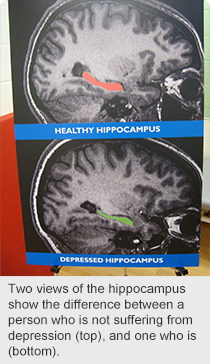
October 21, 2014
Story and photos by Kerri Robins
 When teens are depressed, the seriousness of the situation can reach beyond normal adolescent mood swings or sadness.
When teens are depressed, the seriousness of the situation can reach beyond normal adolescent mood swings or sadness.
“About 15 per cent of teenagers will suffer a major depressive episode,” says Dr. Frank MacMaster, holder of the Cuthbertson & Fischer Chair in Pediatric Mental Health, and researcher with the University of Calgary’s Alberta Children’s Hospital Research Institute and Hotchkiss Brain Institute.
“It seriously affects young people’s abilities to function within their families, with their friends and at school, and is a major risk factor for suicide.”
MacMaster leads a research team now studying the effect of intensive aerobic activity on brain plasticity, or changeability. Scientists at the Alberta Children’s Hospital and the University of Calgary have teamed up with the Calgary YMCA to investigate whether exercise increases the size and health of the hippocampus — the area of the brain responsible for learning and memory as well as regulating a person’s response to stress.
The pilot study, the first of its kind in Canada, began in February and is expected to last two years. It involves 30 teens with mild to moderate clinical depression who have not received treatment for their condition.
“Depression is a major public health problem which often begins in adolescence,” says MacMaster.
“Signs of depression include major swings in routine happening over an extended period of time — for example, loss or increase in appetite, or lack of sleep to sleeping most of the day. It’s critical to note these changes and speak to your doctor.”
According to the Canadian Mental Health Association, suicide numbers among the leading causes of death among Canadians ages 15-24.
Research also shows that the size of the hippocampus is smaller in people suffering from depression than in those who are not. This study will examine whether aerobic exercise can increase the size and health of the hippocampus through more efficient processing of oxygen.
It is believed that exercise can help restore brain cell connections and improve brain function, thus reducing depressive symptoms.
Study participants, who range in age from 16 to 18, will take part in a 12-week exercise program of structured cycling and spin classes.
A key part of the study involves neuro-imaging of the hippocampus using the 3 Tesla Magnetic Resonance Imaging scanner (3T MRI) at the Alberta Children’s Hospital. Participants will undergo imaging of their brain before starting the program and again after they’ve completed it.
Shannon Doram, Vice President Health and Wellness for YMCA Calgary, is a big proponent of the study.
“Lessons learned from this project will inform future programming at the YMCA so that more adolescents have the opportunity to belong, grow, thrive and lead throughout their lives,” says Doram.
Saifa Koonar, President and CEO of the Alberta Children’s Hospital Foundation, says she’s proud of the study that was made possible through donations.
“Knowing that mental health issues are among the biggest health problems facing children and young people in Canada today, it’s essential that we all work together to find more ways to help those who are suffering,” says Koonar.
If you or someone you know is showing signs of depression, please call the mental health help line at 1.877.303.2642. For more information, visit childrenshospital.ab.ca